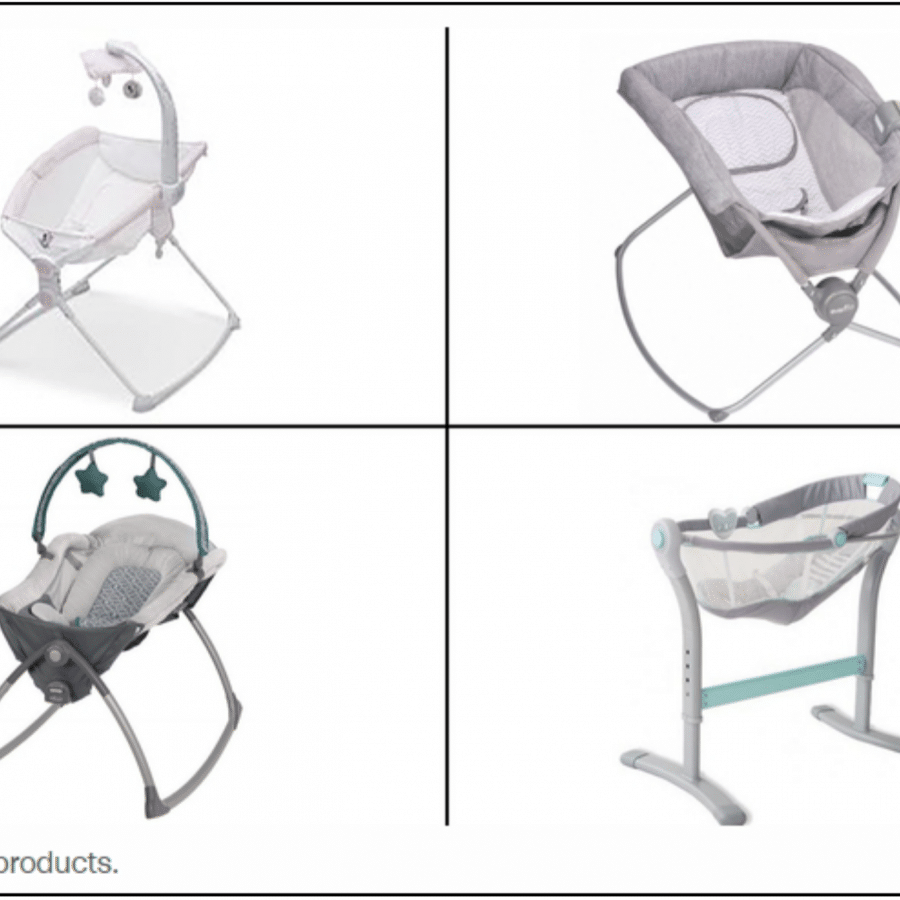Baby inclined sleepers pose a serious threat of injury or death to infants by suffocation, with at least 73 deaths linked to the devices since 2005.
As a result, the U.S. Consumer Product Safety Commission (“CPSC”) announced on Jan. 29, 2020 a recall of more than 165,000 baby inclined sleepers, which were pulled from major retailer shelves in December.
This article provides a brief overview of the risks posed by these devices.
The CPSC has a long history of issuing safety alerts and recalls with inclined infant sleep products, including baby hammocks, starting in May 2000. The major risk: blocked airways when a baby’s relatively heavy head tilts down toward the chest, to the side or when they unexpectedly flip over on their stomach.
Analysis of news accounts, including a continuing investigation by Consumer Reports, question nearly 10 years of inaction by American safety regulators and device manufacturers. Such investigations highlight several cases involving inclined sleepers made by manufacturer, Fisher-Price:
- A March 2018 Knoxville, TN, death of a 7-week-old daughter in a sleeper next to her mother’s bed.
- A July 2014 Atlanta, GA, incident with a 7-week-old boy not breathing while his head was unusually turned to the side, blocking his trachea. His grandmother noticed his face was blue, revived him and rushed him to the hospital, where he recovered.
- A September 2011 Nazareth, PA death of a 15-week-old boy, ruled as a Sudden Infant Death Syndrome (SIDS) case.
After more than 30 reported infant deaths over 10 years with two specific products, the CPSC recalled 4.7 million Fisher-Price Rock ’n Player Sleepers and nearly 700,00 Kids II Rocking Sleepers in April 2019. Then, in October, it warned consumers not to use infant inclined sleep products. Legislation banning inclined sleepers and other similar unsafe baby products has passed the U.S. House of Representatives and is pending before the U.S. Senate.
Yet, some inclined sleepers remain on the market or may continue to be in use at nurseries.
The CPSC received 1,108 incident reports including 73 infant deaths between January 2005 and June 2019, according to an Oct. 31, 2019 CPSC press release. It hired independent expert, Erin Mannen, Ph.D.,a mechanical engineer specializing in biomechanics at the University of Arkansas for Medical Sciences, to study the issue.
Because of a lack of clear documentation in some cases, 59 of the fatalities and 392 nonfatal incidents – some requiring hospitalization for injuries ranging from respiratory issues to falls – were linked to inclined sleep products, according to the CPSC. See Supplemental Notice of Proposed Rulemaking for Infant Sleep Products, CPSC, p. 13, available at https://www.cpsc.gov/s3fs-public/SupplementalNoticeofProposedRulemakingforInfantSleepProducts_10_16_2019.pdf (Oct. 16, 2019).
Other child deaths, in the absence of documented alternative causes, may have unknowingly been cataloged by coroners as “SIDS” (Sudden Infant Death Syndrome).
Mannen and her team were tasked with evaluating the design of inclined sleep products and testing infant muscle movement and oxygen saturation in various devices and positions. Studying babies ages 2 to 6 months old, they found none of the inclined products safe for infant sleep, especially devices with inclines of 20 degrees or more, which increase the risk of suffocation. She recommended additional product study of inclines between 10 and 20 degrees. Mannen also determined that soft and plush sleep surfaces posed potential dangers to infants.
“None of the inclined sleep products that were tested and evaluated as a part of this study are safe for infant sleep,” the report found.
“Since 1992, the American Academy of Pediatrics (AAP) has recommended that infants under the age of one should be placed for sleep on a flat and firm surface in the supine position to reduce the incidence of Sudden Infant Death Syndrome (SIDS). The rate of SIDS deaths has decreased by 70% since the National Institute of Child Health and Development (NICHD) ‘Safe-to-Sleep’ campaign (formerly ‘Back-to-Sleep’) was implemented in 1992.”
The study determined that inclined surfaces and sleep products resulted in higher infant turning activity from supine (face-up) to prone (face-down) positions; caused greater neck and torso adjustments by babies to correct restricted breathing; and led to movements increasing fatigue and suffocation.
CPSC staff also identified other design issues, including mold growth causing respiratory and skin ailments; physical deformations such as flat head syndrome and twisted neck syndrome; and electrical issues from battery leakage, shock or overheating of components which play music, rock, or vibrate the sleepers.
(Map of Mannen study of 70 inclined sleep product incidents investigated in 29 states. Blue pins = death; orange = injury; green = hazard. Taken from Mannen Biomechanical Analysis of inclined Sleep Products—Final Report, p. 97, available at https://www.cpsc.gov/s3fs-public/SupplementalNoticeofProposedRulemakingforInfantSleepProducts_10_16_2019.pdf (Oct. 16, 2019).
Last month’s Consumer Product Safety Commission recall involved four major distributors:
- 111,000 Graco Little Lounger Rocking Seats (rocking seats and vibrating loungers), Model Nos. 1872034, 1875063, 1875102, 1877160, 1882081, 1896313, 1908957, 1914283, 2047734 and 1922809. Manufactured in China and imported by Graco Children’s Products Inc., of Atlanta, GA. Sold at Target, Babies R Us and other stores from 2013 through 2018 for about $80.
- 46,300 SwaddleMe By Your Bed Sleeper inclined sleepers, Model No. 91394. Manufactured in China and imported by Summer Infant (USA) Inc., of Woonsocket, R.I. Sold at stores nationwide including Amazon.com and Buy Buy Baby from March 2017 through December 2019 for about $99.
- Approximately 5,900 Beautyrest Beginnings Incline Sleepers with Adjustable Feeding Position for Newborns; Disney Baby Minnie Mouse Incline Sleeper with Adjustable Feeding Position for Newborns; Delta Children Deluxe 3-in-1 Activity Rocker, Feeder and Sleeper; Simmons Kids Beautyrest Deluxe 3-in-1 Activity Rocker, Feeder, and Sleeper; 3-in-1 Activity Rocker, Feeder and Incline Sleeper and others. Model Nos. include 27404-2255, 27404-437, 27404-758, and 27404-942. Manufactured in China and imported by Delta Enterprise Corp., of New York, N.Y.
- Nearly 3,100 Pillo Portable Napper inclined sleepers, Model No. 12132125. Manufactured in China and imported by Evenflo Company, Inc., of Piqua, Ohio. Sold at stores including Target, Kohl’s, Amazon.com, Buy Buy Baby, JC Penney and Walmart from May 2017 through January 2020 for about $75.
For safe baby sleep tips, the U.S. Consumer Product Safety Commission suggests visiting its Cribs and Infant Products Information Center web page.
Helpful Links:
https://www.consumerreports.org/child-safety/while-they-were-sleeping/
https://www.consumerreports.org/recalls/graco-evenflo-sumr-brands-and-delta-recall-infant-inclined-sleepers/
https://www.cbsnews.com/video/inclined-sleepers-for-infants-need-tougher-standards-study-says/
https://www.cbsnews.com/news/inclined-sleepers-blamed-in-infant-deaths-daycare-centers-still-using-despite-recall/
https://www.cnn.com/2020/01/29/health/infant-incline-sleeper-recall-trnd/index.html


